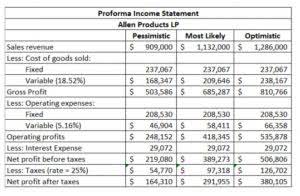
When you calculate break-even point in dollars, you’re estimating how much revenue your restaurant will need to generate to end with a $0 balance at the end of a certain period of time. It’s great that a customer raved about a dish, but what are the numbers telling you? Your POS can give you deep insights on best and worst sellers, menu sales trends over time, and your inventory status.
Restaurant Bookkeeping 101 – 5 Step Simple Guide
Analyzing financial reports such as profit and loss statements, balance sheets, and cash flow statements empowers informed decision-making. Effective bookkeeping is a crucial aspect of running a successful cafe or restaurant. Maintaining accurate financial records, tracking sales and expenses, managing payroll, and staying compliant with tax regulations are essential for the business’s financial health and growth. Cloud-based bookkeeping services, like Remote Books Online, offer specialized solutions for cafes and restaurants.

How do you categorise and calculate café expenses?
- These perks mean you can spend more time perfecting your coffees and sandwiches, creating menus, and developing your business.
- QBO has worked very well for all of our restaurant clients, so we recommend it 100% of the time.
- Despite the complexities involved in running a restaurant and the unique challenges posed by the industry, maintaining seamless accounting and restaurant bookkeeping processes is achievable.
- Assets are things you own, like equipment, inventory, and straight cash.
- It’s the best way to turn your dreams of a thriving business turn into hot cup of reality.
- Even though restaurant accounting is daunting, understanding the basics is not impossible.
- Properly handling payroll and fulfilling tax obligations on time prevent potential penalties.
Multiple wages and staff positions are the norms in the restaurant industry, and the ability to accommodate different rates is vital. Choose a system that is easy to use for employees and customers that can seamlessly tie in with your accounting software. And, most importantly, start shopping around for a specialist accountant and scalable accounting software. It’s the best way to turn your dreams of a thriving business turn into hot cup of reality. Because it simply records cash in and out, cash accounting makes it much easier to complete your own accounts and Self Assessment.
How Remote Books Online do Bookkeeping for Cafes and Restaurants
Lots of individual points of sale happen each day though, so keeping a close record of everything is important. Cost of Good Sold (COGS) is a KPI that shows how accurately you’re pricing your food items and controlling your inventory. Keeping track of your COGS ration will help you reduce and maintain your inventory costs.
They also help you plan and manage risk effectively, including how you manage your debt levels. With everyone that goes into keeping your books up to speed, it might make sense to hire a qualified and accredited finance professional to help you. Your gross profit is the difference in value between the selling price of a dish and the cost of the ingredients and materials used to make a dish (your COGS). Getting your financials right can actually help your business deliver on that very passion that motivates you in the first place.
Gusto Payroll For Restaurants
Account reconciliation also catches accounting errors and keeps track of your transactions. Your financial forecast gives you a rough estimate of how much revenue you’ll generate in the future. Your balance sheet also shows your equity, so your net worth; it’s what’s left over at the end of the day when assets are subtracted from liabilities. This could mean reducing operating costs or finding ways to generate more income to cover debts. Because of this, they require specific accounting methods and benchmarks that wouldn’t apply to, say, a retail store.
Keep Your Coffee Shop Business Accounts Clean.
Just because someone paid with their credit card doesn’t necessarily mean all the money will magically land in the bank and everything will always go smoothly. It may be good to stay aware of deposit amounts and invoices so there aren’t any errors there. Again, software can help but taking regular time to double-check everything here and there is also a good idea. The more you can monitor the financial health of your restaurant, the better.

Opening a business current account
Check out all of the available accounting software products available on FreshBooks. The cost of goods sold represents the costs of making and selling your products at any given time, including inventory costs. Whether running a small bakery or a fine dining restaurant, you need a POS system for cash management, sending or printing receipts, inventory management, order management, and back-office reporting. This is further broken down into business-specific categories or sub-accounts, such as inventory, sales, and marketing. While setting up the chart of accounts, it’s important to decide the metrics you want to monitor.
Bookkeeping tips for a small cafe
For DIY bookkeepers, this means careful record-keeping and keeping a close eye on your tax obligations. Keeping on top of your bookkeeping is worth far more than avoiding tax season headaches. With diligent financial practices, the right expertise, and sophisticated reporting mechanisms, you’re laying a foundation for business decisions based on the financial heart of your restaurant. The more https://www.bookstime.com/ transparency you have into the key performance indicators that monitor the health of your restaurant, the more swiftly you can take decisive action to remedy wounds. You need to keep accurate records if you’re going to pay the right amount of tax. But good bookkeeping can also help you make accurate estimates about exactly how much you’ll have to pay based on your income and expenses.
Financial Reporting and Analysis
- When you achieve your goals, celebrate your success and use it as motivation to continue improving your restaurant’s financial performance.
- Restaurant accounting software is specifically designed to help restaurants manage their financial transactions.
- By using cloud-based accounting software, they ensure secure access to data and real-time collaboration, enabling owners to make informed decisions from anywhere.
- This will give you an insight into how much your business costs to run.
- If your café is a limited company and/or if your turnover is over £150,000, you must prepare your accounts on the traditional accrual basis.
The chart of accounts records high-level transactions like revenue, expenses, assets, liabilities, cost of goods sold, and equity. Each of these buckets is further categorized into smaller ones, such as meat costs, alcohol costs, staff wages, marketing, utilities, laundry, etc. Restaurant bookkeeping has to do with recording the finances of coffee shop accounting your restaurant. From payroll to the cost of inventory, to rent and systems costs, you must track every penny flowing in and out. Keep these five simple steps in mind and bookkeeping for your restaurant will become a lot more manageable. In summary, bookkeeping is the backbone of financial control and management in the restaurant industry.

